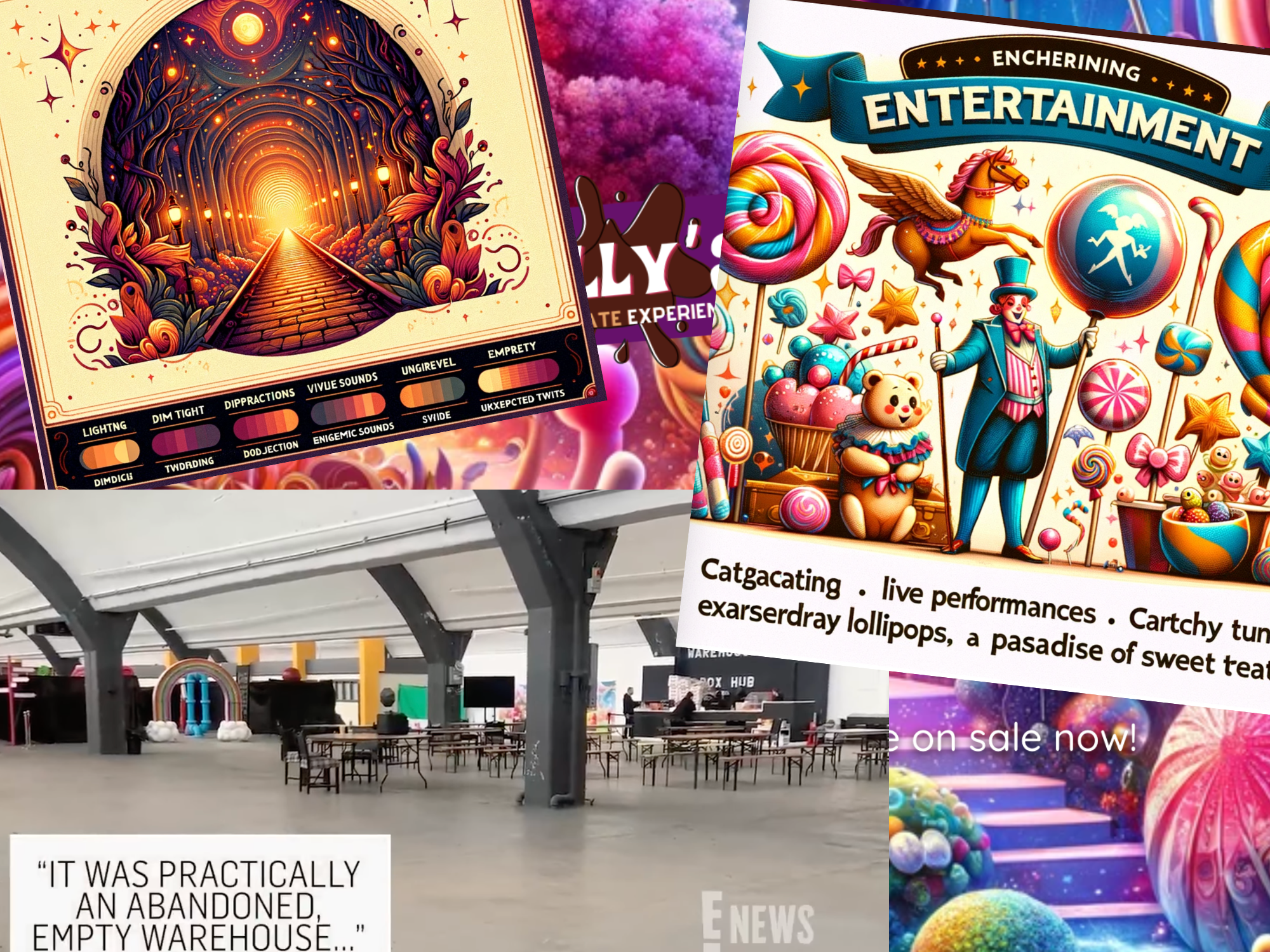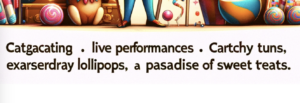Can artificial intelligence be artistically creative?
While we might want to celebrate our human uniqueness and say, “Of course not!” when we stop to think about it, the answer is pretty clearly, “Yes.” Humans have been collaborating with computers in the realm of music, art, and literature for years. Philosophers can debate what truly counts as “creativity,” but the more pressing question right now is, “Will AI’s ability to generate inexpensive writing (or art or music) replace a person’s livelihood?” After all, the Writer’s Guild of America had to go on strike for almost 150 days to ensure that writers’ Intellectual property and sources of income were protected. The struggle between artistic expression and monetary reality, however, goes back as far as both have existed.
Last week, photos of the “Willy Wonka Experience” in Glasgow went viral as it brought these questions to the forefront. The website offered beautiful images of a land of “Pure Imagination” and enticed people to spend nearly $50 USD to have an “immersive experience.” But there were some red flags – there were no actual photos of the experience itself, and the website announced that there would be “Cartchy tuns” and “exarseday lollipops:”
(The image is a screen grab from the website’s AI-generated text: https://willyschocolateexperience.com/)
As Paul Connell, the actor playing Willy Wonka described it, the script for the event was “15 pages of AI-generated gibberish;” as the children and parents came in, hoping for a magical experience, they were instead given one jelly bean and a half a cup of lemonade in an event housed in a barren warehouse. The people who ran the experience weren’t looking to provide a memory for a lifetime or bring an artistic vision to life. It was a scam.
Compare that to the dynamic of money and art in this week’s Torah Portion, Vayakhel. In it, we continue reading about the construction of the Mishkan, the Tabernacle, which will house the ark of the covenant and be the location for where God dwells. This undertaking wasn’t cheap. In addition to the half-shekel that everyone had to contribute, this week’s portion shows the additional generosity that the Israelites brought forward for the construction of the Mishkan:
So the whole community of the Israelites left Moses’ presence. And everyone who excelled in ability and everyone whose spirit was moved came, bringing to Adonai an offering for the work of the Tent of Meeting and for all its service and for the sacral vestments. Men and women, all whose hearts moved them, all who would make an elevation offering of gold to Adonai, came bringing brooches, earrings, rings, and pendants — gold objects of all kinds. (35:20-22)
Here, there was a recognition that materials, time, and effort were valuable. The Israelites contributed finery, gold, and precious stones. And in return, God appointed artisans, who were “Chacham lev” – possessing “wisdom of the heart,” translated below as “skilled”:
Let, then, Bezalel and Oholiab and all the skilled persons whom Adonai has endowed with skill and ability to perform expertly all the tasks connected with the service of the sanctuary carry out all that Adonai has commanded. Moses then called Bezalel and Oholiab, and every skilled person whom Adonai had endowed with skill, everyone who excelled in ability, to undertake the task and carry it out. (Exodus 36:1-2)
It wasn’t just two people with the chochmat lev, wisdom of the heart, and to whom God sent a commandment; it was “All the skilled persons” who were there to beautify the Mishkan. The Israelites provided the funds, and the artisans created a thing of beauty.
Bringing our skills, our wisdom, our particular knowledge to a task is a gift, and one that should be valued – indeed, we strive to beautify a mitzvah. And in the Willy Wonka Experience, even though the actors had a “Coontract” [sic] and realized that they had been scammed as well, when it came time to perform, they brought their gifts to the world as best they could. As Connell said, “All the actors were lovely people. We gathered together in the morning and said, ‘We’re probably not going to get paid for this, but kids are still going to come up. Let’s make this as magic as possible for them.”
Though the value of creativity isn’t a new question, the rise of AI will super-charge the see-saw between money and artistry – what do we value? How much are we willing to compromise? How much are we willing to pay? As Professor Andrew Rogoyski highlighted,
“People and the companies who adapt, adopt, and learn how to use these tools properly will thrive. And I think human creativity will win out, and people will continue to do fantastic, amazing things… but the use of AI must be centred around people, not profit.”
Bezalel, Oholiab, and the Israelites did the antithesis of cutting corners – they brought their “Wisdom of the heart” to this sacred task. And, perhaps equally important, their time and wisdom were valued. In fact, it was so valued that they had to tell the Israelites to stop bringing gifts! (36:3-7) They also recognized the devotion and thought that the artisans brought to the project. They weren’t filling up space with “15 pages of AI gibberish.”
Because in the end, if we bring the wisdom of our heart to our creation, it will come through. And perhaps even bring us a little closer to the Divine.

Rabbi Geoffrey A. Mitelman is the Founding Director of Sinai and Synapses, an organization that bridges the scientific and religious worlds and is being incubated at Clal – The National Jewish Center for Learning and Leadership. He was ordained by the Hebrew Union College-Jewish Institute of Religion and served as Assistant and then Associate Rabbi of Temple Beth El of Northern Westchester. In addition to My Jewish Learning, he’s written for The Huffington Post, Science and Religion Today, and WordPress.com. He lives in Westchester with his wife, Heather Stoltz, a fiber artist, and their daughter and son.


